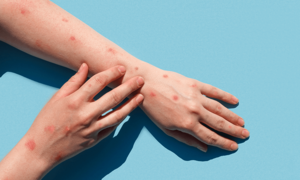March 30, 2023
A paper produced as part of the DAKI-FWS project (data and AI-supported early warning system to stabilize the German economy) will be featured in the prestigious journal Nature Medicine. The paper, "A deep learning algorithm to classify skin lesions from mpox virus infection," was written by Dr. Alexander Thieme, project leader at Charité, in collaboration with researchers at Stanford University School of Medicine and Dr. Jackie Ma of the Fraunhofer Heinrich-Hertz-Institut (HHI), overall project leader of DAKI-FWS, as well as other outstanding partners. It provides the scientific basis for the project's PoxApp (https://poxapp.charite.de and https://poxapp.stanford.edu ), an AI-based app that can determine a risk score for monkeypox infection and thus help contain the virus. The DAKI-FWS consortium project strives to use AI technologies to link and evaluate data and, on this basis, develop an early warning system for future crisis situations - for example, infectious diseases.
The German Federal Ministry for Economic Affairs and Climate Action (BMWK) is funding DAKI-FWS as part of the "AI Innovation Competition” with approximately 12 million euros. The Fraunhofer Heinrich-Hertz-Institut (HHI) and its "Artificial Intelligence" department are acting as consortium leaders in the project. DAKI-FWS launched at the beginning of December 2021 and is scheduled to run for three years. Fraunhofer HHI contributes to this project its research expertise in the field of multimodal machine learning. As a leading position of the ITU/WMO/UNEP focus group "AI for Natural Disaster Management", it also offers its experience in the field of AI-based prediction and classification in the context of environmental and natural disasters.
Monkeypox virus (also known as mpox virus or MPXV) has triggered an ongoing outbreak with more than 86,000 confirmed cases in more than 100 countries. It has been declared an international health emergency by the World Health Organization (WHO). While the number of new infections has currently declined, the outbreak is not considered to be over. Although transmission of this zoonotic infection has historically been mostly animal-to-human, the current outbreak marks the first time that sustained human-to-human transmission has occurred. Modeling by the European Center for Disease Prevention and Control has shown that MPXV outbreaks result primarily from undetected infections and delayed isolation. That's why it's important to detect cases as soon as possible. The DAKI-FWS team is addressing this by developing an AI-based case definition for detecting MPXV infections.
The majority of MPXV infections are associated with skin lesions that occur at various stages during the course of the disease. In the DAKI-FWS study, the researchers developed a novel neural network (Deep Convolutional Neural Networks, CNN) with more than 90% accuracy in detecting MPXV skin lesions. Using the PoxApp, individuals who are concerned about MPXV infection can upload images of skin lesions and receive an initial assessment. The goal is for patients with MPXV infection to receive appropriate medical treatment more quickly and isolate themselves early.
Therefore, the DAKI-FWS study aimed to evaluate the performance of the CNN for detecting MPXV skin lesions (MPXV-CNN) in photographs and to integrate the CNN into the PoxApp. The research team trained the CNN on a large number (more than 138,000) of images and investigated the performance of the CNN in different situations, e.g., for varying skin tones and body locations of the skin lesions. The key was to evaluate the CNN's ability to distinguish MPXV skin lesions from other acute skin diseases (e.g., allergies, measles, scabies). Based on this research, the research team developed the web-based PoxApp, which patients who suspect infection with the MPXV virus can use free of charge. The app can be used anonymously and users have the option to volunteer their photos for research purposes. The researchers plan to release updated versions of the app when users have uploaded more photos, as the algorithm can provide more accurate results with a larger data pool.
Nature Medicine is a monthly journal with an impact factor of 87.241 that publishes peer-reviewed original research from all areas of medicine. The publication of the DAKI-FWS team and the PoxApp of Charite and Stanford University are open access.
